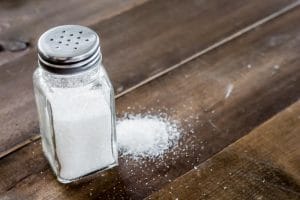
(First published on Linkedin)
How often do you see a statement ‘extra salt’ when examining the labels on food? Not often. Today, we are far more likely to see ‘reduced salt’ or ‘no added salt’. Last year, my father – a former Professor of Cardiac Surgery, and a great man – died. He was 86 years old – a good age. He loved adding salt to every meal…. and sugary snacks.
For a few years, I have questioned the scientific evidence available that supports claims that ‘reduced salt’, or ‘no added salt’ is healthier? To date, no clinical trial has determined that a higher salt intake is detrimental to a healthy person.
Clinical Trials
Organizations run clinical trials to study the safety and efficacy of compounds to treat a condition. Would it be possible to run a clinical trial to assess the comparative health benefits of a low salt diet versus a high salt diet? Sounds logical. However… we have a catch…
Running clinical trials is an expensive exercise. Funding is typically based on an positive financial outcome – either for a commercial organization, or for a government organizations that can prove a national health benefit. Salt is of course a commodity. Suppliers would be unlikely to fund research. Another challenge is the long term nature of such a trial. It would take many years to prove or disprove a reduction in salt intake had a positive (or negative) effect.
Technology to confirm or deny a perception
This is one of the areas that I was keen to address in our technology venture. To create a cloud platform that would create a data acquisition environment that was affordable for high numbers of patients. We have made some progress.
As of March 2015, we are running a global 10,000 patient trial in the field of Venous Thrombosis. We have plans to extend this to a second study with up to 50,000 patient study – both observational.
Both trials would traditionally be cripplingly expensive to support on typical EDC technology platforms.. but, with a single instance solution, running on a cloud platform, we are able to achieve an economy of scale.
So… would it be possible to run a large scale health outcomes study looking at salt intake? Yes, I believe it would. The study would most likely run as a direct-to-patient virtual trial – a method we already have experience in. Data capture would be through periodic questionnaires, following the capture of baseline demographic information. We might also supplement the information for patients that opted in, with data from biometric devices such as blood pressure, sleep partners, etc.
Of course, such study methods would not be limited to just salt intake. Similar methods could be applied to the study of other items such as Cholesterol reducing nutritional foods, water consumption, or even soaps and shampoos.
Exciting opportunities ahead…
Reference: Fact or Myth: Sodium Raises Blood Pressure

